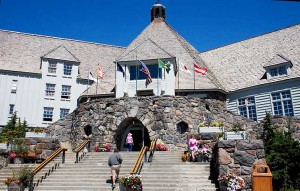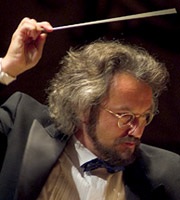By Bob Hicks
Over at Oregon Live, Friend of Scatter D.K. Row reports that Oregon’s two major gubernatorial candidates, Demo John Kitzhaber and the GOP’s Chris Dudley, have pretty much nothing to say about how they would or wouldn’t approach statewide funding and other support for the arts. Both ducked a request by the statewide lobbying group Cultural Advocacy Coalition to talk it out in a town hall meeting before the election. And both ducked the chance to comment to D.K. for his story.
 No surprise here. With the state budget circling the toilet bowl and getting ready for the big flush, neither candidate is likely to come out promising anything to anyone about arts and culture. Remember last year, when the Democrat-dominated legislature raided the state’s supposedly sacrosanct Cultural Trust fund in an attempt to pay the bills.
No surprise here. With the state budget circling the toilet bowl and getting ready for the big flush, neither candidate is likely to come out promising anything to anyone about arts and culture. Remember last year, when the Democrat-dominated legislature raided the state’s supposedly sacrosanct Cultural Trust fund in an attempt to pay the bills.
Portland city commish Nick Fish, who’s also a board member of the Cultural Trust, called the candidates’ no-talk “a missed opportunity.” But even some arts leaders expressed sympathy for a pair of guys caught between a rock and a hard place. “When I think of the immense economic problems the next governor has to solve, my stomach hurts,” Chris Coleman told Row. “The notion of even advancing a cultural agenda would be hard right now. So I understand. If I was running for governor, it’d be hard for me to find time for the arts.” Coleman is artistic director of Portland Center Stage. He also happens to be board president of the Creative Advocacy Network, Portland’s coalition of arts boosters in the political ring.
Whoever wins the governor’s race, don’t be expecting a neo-WPA, folks. The feds are pretty much out of this picture, FDR’s kicked the bucket, and we already got our Timberline Lodge. Arts and culture will be looking at a lot of pay-as-you-go. Oops. That’s sort of what the Cultural Trust was before the big raid, wasn’t it?
*
The trouble with TBA, the annual late summer/early fall festival thrown by the Portland Institute for Contemporary Art, is that it always hits town in late summer/early fall.
A lot of people set their annual calendars around this thing. Here at Art Scatter, it always sneaks up on us, and, too often, slips right past us. We tend to be traveling a lot this time of year, and preparing young heathens for schooling, and tending to such crucial matters as putting up the annual supplies of pickles and chutney.
All of which is to say that (like the guv guys on arts funding) we have pretty much nothing to say about TBA this year. Fortunately, several other keen observers do. Here are a few places to look for news and comment:
Arts Dispatch. Barry Johnson sees and extrapolates.
Urban Honking. PICA’s own site invites such luminaries as Mead Hunter of Blogorrhea to do the Monday morning quarterbacking.
Oregon Live. Expect steady updates from The Oregonian’s cultural squad.
Culturephile. Anne Adams and Claudia La Rocco have been pickin’ em and writin’ em for Portland Monthly’s blog.
*
PHOTO: Timberline Lodge: the last word in Oregon cultural funding? Kelvin Kay/Wikimedia Commons


 What this means is that, while you’re filing into Keller Auditorium before the show, I’ll be in the lobby seated at a table with several other bloggers, dashing out immediate impressions and committing them to cyberspace before I have time to repent and delete. I’ll have a backstage tour beforehand, and yes, I do get to see the show, after which I’ll dash back to my laptop and blog some more. This will be either the rough draft of history or outtakes of an unsifted mind, but I will Not. Look. Back.
What this means is that, while you’re filing into Keller Auditorium before the show, I’ll be in the lobby seated at a table with several other bloggers, dashing out immediate impressions and committing them to cyberspace before I have time to repent and delete. I’ll have a backstage tour beforehand, and yes, I do get to see the show, after which I’ll dash back to my laptop and blog some more. This will be either the rough draft of history or outtakes of an unsifted mind, but I will Not. Look. Back. So when Susan asked whether I’d be a guest performer in Well Arts’ fall show, Voices of Our Elders, I said yes. The process is fascinating. Well Arts people do a 10-week workshop on memoir and creative writing with older people in care centers, listening to their stories, transcribing them, helping them shape them. The result is a show of monologues and a few dialogues from people looking back on their lives, on what was important, and contemplating what’s to come. It’s a fundamental form of personal history and an emotionally involving form of documentary theater.
So when Susan asked whether I’d be a guest performer in Well Arts’ fall show, Voices of Our Elders, I said yes. The process is fascinating. Well Arts people do a 10-week workshop on memoir and creative writing with older people in care centers, listening to their stories, transcribing them, helping them shape them. The result is a show of monologues and a few dialogues from people looking back on their lives, on what was important, and contemplating what’s to come. It’s a fundamental form of personal history and an emotionally involving form of documentary theater. The symphony’s kicking into its season. So are the opera and the city’s theater companies. Ballet is getting ready to haul out the slippers. Across the city, tuxedos are coming out of mothballs (OK, that’s an exaggeration: This IS Portland) and uptown revelers are dusting off their dancing shoes.
The symphony’s kicking into its season. So are the opera and the city’s theater companies. Ballet is getting ready to haul out the slippers. Across the city, tuxedos are coming out of mothballs (OK, that’s an exaggeration: This IS Portland) and uptown revelers are dusting off their dancing shoes.